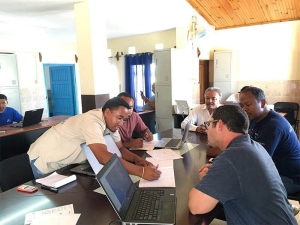Center for Humanitarian Engineering and International Development to Deliver Innovative Learning Experiences with a Global Perspective

VILLANOVA, Pa.—The College of Engineering has announced the launch of a Center for Humanitarian Engineering and International Development at Villanova University. Building on the decade-long success of the Villanova Engineering Service Learning (VESL) program, the new Center will engage students in unique learning opportunities that reinforce engineering fundamentals, a commitment to life-long learning and service to society. In addition to integrating VESL’s service-learning opportunities into its auspices, the Center will establish research and academic programs—launching a new minor in Humanitarian Engineering—and will formalize a strategic partnership with the graduate program in Sustainable Engineering, which includes graduate fellowships and a track program in engineering for international development.
According to Center Director Dr. Jordan Ermilio ‘98 ME, ‘06 MSWREE, P.E., MSWRE, RPCV, the Center will serve three primary purposes:
- Develop and deliver a rigorous curriculum within the context of humanitarian issues globally
- Implement high quality research employing applied participatory methods
- Provide technical support with a focus on humanitarian engineering and international development
“The Center is consistent with the University’s and College’s strategic plans, which both call for deeper engagement and internationalization of the academic experience,” says Dr. Ermilio. "Meeting the needs of a new generation of students means providing experiences that address complex global issues with divergent views and multi-cultural awareness.” Working with humanitarian organizations also benefits faculty, providing opportunities to conduct meaningful research in a global context.
Dr. Andrea Welker, associate dean of Academic Affairs, adds, “The Center offers an ideal means of integrating Villanova’s Augustinian Catholic values into the educational experience. Its mission is at the heart of the University’s commitment to educating a ‘community of learners who are driven to think critically, solve problems, act compassionately and succeed while serving others'."
Since 2011 when VESL was formally established, hundreds of Villanova students have served with global partners on community initiatives in Asia, Africa and the Americas. Many describe these life-changing experiences as the highlight of their Villanova education, including Brian Bozzo ’07 ME, an intellectual property attorney and founder of Knots Apparel, whose sales benefit a variety of charities. Bozzo says: “My experience with engineering service learning was truly transformative. It provided me with an opportunity to apply my engineering skills for the benefit of others, which is the hallmark of the Villanova experience. The faculty and staff inspire you to learn not only for the sake of learning, but to develop the skills and character necessary to face the world and its many challenges.”
Strengthening existing programs and partnerships by integrating service/outreach and research is Dr. Ermilio’s goal for implementation in the Center’s first year. Above all, he says, “Ethical engagement and impact through collaboration with global partners will be fundamental to the Center’s success.”
About Villanova University College of Engineering: Founded in 1905, Villanova University College of Engineering is committed to an educational program that emphasizes technical excellence and a liberal arts education within the framework of the University’s Augustinian Catholic tradition. The result is rigorously educated, socially grounded, conscientious thinkers and doers who are professionally prepared to make meaningful change in the world.
About Villanova University: Since 1842, Villanova University’s Augustinian Catholic intellectual tradition has been the cornerstone of an academic community in which students learn to think critically, act compassionately and succeed while serving others. There are more than 10,000 undergraduate, graduate and law students in the University's six colleges—the College of Liberal Arts and Sciences, the Villanova School of Business, the College of Engineering, the M. Louise Fitzpatrick College of Nursing, the College of Professional Studies and the Villanova University Charles Widger School of Law. Ranked among the nation’s top universities, Villanova supports its students’ intellectual growth and prepares them to become ethical leaders who create positive change everywhere life takes them. For more, visit www.villanova.edu.
